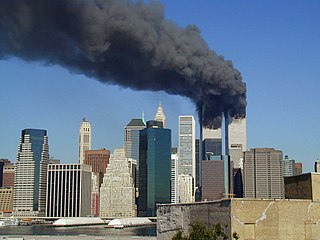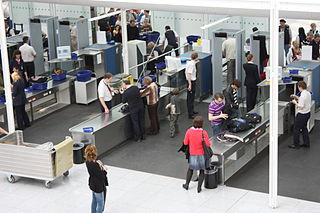
United Nations Security Council Resolution 1373, adopted unanimously on 28 September 2001, is a counterterrorism measure passed following the 11 September terrorist attacks on the United States. The resolution was adopted under Chapter VII of the United Nations Charter, and is therefore binding on all UN member states.

United Nations Security Council resolution 1566, adopted unanimously on 8 October 2004, after reaffirming resolutions 1267 (1999), 1373 (2001) and 1540 (2004), the Council condemned terrorism as a serious threat to peace and strengthened anti-terrorism legislation.
The Financial Sanctions Unit of the Bank of England formerly administered financial sanctions in the United Kingdom on behalf of HM Treasury. It was in operation since before 1993, when it applied sanctions against the Government of Libya. More recently, since Libya became an ally of the United Kingdom, sanctions have been applied against those who allegedly fought against the Government of Libya at the time it was not an ally. Responsibility for the administration of Financial Sanctions in the UK transferred from the Bank of England to HM Treasury on 24 October 2007. In April 2016 HM Treasury set up the Office of Financial Sanctions Implementation, a new body whose mission is to "provide a high-quality service to the private sector, working closely with law enforcement to help ensure that financial sanctions are properly understood, implemented and enforced."
The ISIL (Da'esh) and Al-Qaida Sanctions Committee is a committee of the United Nations Security Council tasked with implementing international sanctions against the Islamic State and al-Qaeda. It was established as the Al-Qaida and Taliban Sanctions Committee on 15 October 1999, pursuant to Security Council Resolution 1267, which designated al-Qaeda and the Taliban as terrorist organizations. Following the creation of a separate Taliban Sanctions Committee on 17 June 2011, it was renamed the Al-Qaida Sanctions Committee. The scope of the sanctions regime was expanded to include the Islamic State on 17 December 2015 pursuant to Resolution 2253.
United Nations Security Council Resolution 1377 was adopted unanimously at a ministerial meeting on 12 November 2001; the Council adopted a declaration concerning efforts to eliminate international terrorism.
United Nations Security Council resolution 1390, adopted unanimously on 16 January 2002, after recalling resolutions 1267 (1999), 1333 (2000), 1363 (2001), 1368 (2001), 1373 (2001) 1378 (2001) and 1383 (2001) concerning the situation in Afghanistan and terrorism, the Council imposed further sanctions on Osama bin Laden, Al-Qaeda, the Taliban and others associated with them.

United Nations Security Council resolution 1452, adopted unanimously on 20 December 2002, after recalling resolutions 1267 (1999), 1333 (2000), 1363 (2001), 1368 (2001) and 1390 (2001) concerning Al-Qaeda, the Taliban and terrorism, the Council decided that financial sanctions against the organisations would not apply to expenses for food, rent, medicine and medical care, health insurance and professional fees.

United Nations Security Council resolution 1455, adopted unanimously on 17 January 2003, after recalling resolutions 1267 (1999), 1333 (2000), 1363 (2001), 1373 (2001), 1390 (2001) and 1452 (2002) concerning Al-Qaeda, the Taliban and terrorism, the council improved the implementation of measures against the groups. It was the first Security Council resolution adopted in 2003.
United Nations Security Council resolution 1526, adopted unanimously on 30 January 2004, after recalling resolutions 1267 (1999), 1333 (2000), 1363 (2001), 1373 (2001), 1390 (2001), 1452 (2002) and 1455 (2003) concerning terrorism, the council tightened sanctions against Al-Qaeda, the Taliban, Osama bin Laden and associated individuals and groups.

United Nations Security Council resolution 1617, adopted unanimously on 29 July 2005, after recalling resolutions 1267 (1999), 1333 (2000), 1363 (2001), 1373 (2001), 1390 (2001), 1452 (2002), 1455 (2003), 1526 (2004) and 1566 (2004) concerning terrorism, the Council renewed sanctions against Al-Qaeda, the Taliban, Osama bin Laden and associated individuals and groups for a further seventeen months.

United Nations Security Council resolution 1624, adopted unanimously at the 2005 World Summit on 14 September 2005, after reaffirming previous resolutions on terrorism, including resolutions 1267 (1999), 1373 (2001), 1535 (2004), 1540 (2004), 1566 (2004) and 1617 (2005), the Council called on all states to co-operate in order to strengthen the security of their international borders by enhancing terrorist screening and passenger security procedures.
Qatar has been accused of allowing terror financiers to operate within its borders, which has been one of the justifications for the Qatar diplomatic crisis that started in 2017 and ended in 2021. In 2014, David S. Cohen, then United States Under Secretary of the Treasury for Terrorism and Financial Intelligence, accused Qatari authorities of allowing financiers who were on international blacklists to live freely in the country: "There are U.S.- and UN-designated terrorist financiers in Qatar that have not been acted against under Qatari law." Accusations come from a wide variety of sources including intelligence reports, government officials, and journalists.

United Nations Security Council Resolution 2249 was unanimously adopted on 20 November 2015. It notably calls upon all Member States to redouble their efforts against both ISIL and the al-Nusra Front as well as other al-Qaeda affiliates as designated by the Security Council.
Sa’d bin Sa’d Muhammad Shariyan Al Ka’bi is a known Qatari financier and facilitator of financial services that support the Qatari branch of Al-Qaeda, as well as Al-Nusra Front (ANF) for the People of the Levant (ANF), an al-Qaeda Syria based affiliate, which is listed by the United States as a terrorist group.
These are some of the notable events relating to politics in 2015.

International sanctions against Afghanistan were implemented by the United Nations in November 1999. The sanctions were initially aimed at terrorists, Osama bin Laden and members of Al-Qaeda. The United States, the United Kingdom and the European Union also impose sanctions on Afghanistan.

United Nations Security Council Resolution 2388 condemned human trafficking, in particular by the Islamic State of Iraq and the Levant (IS), as well as human rights violations by various African terror groups. The resolution was passed in a 15–0 vote, unanimously adopted by members of United Nations Security Council (UNSC). on November 21, 2017.

United Nations Security Council Resolution 2195 was adopted unanimously by the UN Security Council on 19 December 2014. The resolution followed a debate initiated by Foreign Minister of Chad who explained the need to adopt international measures to prevent terrorists from benefiting from multi- national organized crime. This would include cases of arms trafficking, human trafficking, drug trafficking, using aircraft for illegal trade, trade in minerals, kidnapping, extortion and bank robberies. Countries of United nation members were asked to fortify guarding their borders in order to restrict the freedom of movement of terrorists.

United Nations Security Council Resolution 2253 was prepared by the United States and Russia and was unanimously adopted by the UN Security Council on 17 December 2015. The resolution specified that the sanctions that were already in force against Al Qaeda would also focus on the Islamic State in Iraq and to (ISIL/Da’esh). This resolution summed up the criteria according to which persons and organizations could end up on the sanctions list. Countries were also asked to take stricter action to cut off the financing of terrorist groups.










